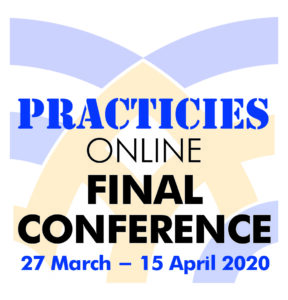The fifth webinar of the PRACTICIES project was a presentation of the “Digital Me” tool developed by the Brussels-based association MAKS (Media Actie Kuregem) to encourage young people from two neighbourhoods of Brussels to express themselves through “digital storytelling”. The presentation was given by Veronique de Leener, founder and director of MAKS.
> Two disadvantaged neighbourhoods in Brussels
Founded in 1999, MAKS works to “develop the talents and skills” of the inhabitants of Cureghem and Molenbeek by “developing innovative methods to encourage people to develop their digital skills”. These are two neighbourhoods with 52% youth unemployment and where half of the population live below the poverty line. Furthermore, a number of young residents left the country over the past few years to join Daesh in Syria and Iraq.
> Telling a personal story in less than three minutes
With digital storytelling, young people produce a video clip of between one and three minutes in which they tell a personal story or share their point of view on a topic. They are then encouraged to share the video as widely as possible on their social media networks
Research – including the work of Lorenzo Vidino, Director of the Program on Extremism at George Washington University in the United States – shows that extremist recruiters exploit emotional “triggers” such as revenge or frustration. They rely on young people’s search for identity and belonging and offer them the opportunity to “take revenge” on the injustices they experience. Digital storytelling is a response that also relies on emotion by allowing young people potentially targeted by extremist recruiters to voice their grievances, assert their identity, express themselves and be heard. “The aim is not to moralise but to give young people a voice and listen to what they have to say,” says Veronique de Leener.
> The advantages of digital storytelling
The digital storytelling method is an emotional approach in which young people can “build” their identity. This is particularly interesting for young people of mixed backgrounds. The methodology developed by MAKS allows them to reflect on their identity and origins and to give them meaning. It is an individual process (everyone tells a story or expresses a personal point of view based on their own experience), in which young people encouraged to express their opinions and use their critical thinking (for example to denounce injustices). Finally, it is an opportunity for young people to feel good and proud once their video is ready and shared around them.
> Tools to promote self-expression
MAKS has developed a playful and educational methodology to teach youngsters how to tell a story: the “identity star” where each of the “branches” represents a theme, such as family, or nationality/religion/origin, or favourite heroes/habitats/animals; the “coat of arms” where they are asked to formulate their motto, values, strengths, symbols that matter to them, and mission; or the “storytelling circle”, where they express themselves in a group without anyone being allowed to criticise or laugh.
> Simple and user-friendly means
The videos are easy to produce: there is no shooting as only photographs are used (either from personal archives or the internet) and then edited in a film sequence. The youngster then add their voice over and, if they so wish, music. This is easily done with a computer or tablet and user-friendly, widely available software.
> Powerful messages
Veronique de Leener presented several videos. In the first one, the author tells the fictional story of three young people who take part in an attack and then “go to eat pork and drink wine at McDonald’s”, which shows that “they are not good Muslims”.
In another, a young man tells how, with a European father and an African mother, he is “neither black nor white” and struggles to know who he is because blacks find him too white and whites too black. “I conclude that I am neither black, nor white, nor of mixed race, but just a human being like all of you, a citizen of the world.”
In a third, a young girl denounces the immigration policy of European countries and unemployment. “If today’s society gave all young people a job, regardless of their origin, there would not be all this horror in Europe,” she says, referring to the terrorist attacks. “That’s why there are terrorists: they are people rejected by society who want revenge.”
> “Active evaluation”
At the end of each workshop (which can last between half a day and a full day), MAKS conducts an “active evaluation” where young participants share what they have learned from the experience.
“Storytelling circles are a way to express oneself without arguing.” “This is the first time we have been able to express ourselves about who we are.” “We had a lot of fun even though the theme was difficult.” “I realise I have something to tell.” “I’m capable and proud of what I’ve done.” These comments sum up what most young digital storytellers take away from Digital Me.
>>> More information on the PRACTICIES project
>>> More information about the PRACTICIES webinars
>>> The webinar’s Power Point presentation
>>> Watch a recording of the Webinar
>>> MAKS’s website




